Enterprise local listing management ensures multi-location businesses maintain accurate, consistent, and up-to-date information across directories, search engines, and maps. By centralizing updates, businesses can prevent errors, enhance local SEO, and strengthen brand credibility without adding manual work.
Summary
Enterprise local listing management transforms local marketing by automating the maintenance of business information at scale, improving visibility, and ensuring customers can easily find and trust every location. This approach reduces inconsistencies, drives more customer interactions, and supports measurable business growth. Companies that implement centralized listing management experience faster updates, stronger online presence, and higher engagement across all locations, aligning operational efficiency with strategic marketing goals.
This blog post explores how to leverage listings to attract customers, improve conversion rates, and grow your business smartly across all your locations.
Table of contents
- What is enterprise local listing management?
- Local listings and their benefits: A quick look for enterprise local listing management software users
- Challenges faced by businesses in enterprise listing management
- How does enterprise listing management differ from single-location business listing management?
- Enterprise local listing management software strategies to monitor local listing performance effectively
- How do you choose the best enterprise local listing management software?
- Mastering enterprise listing management: Key to success for multi-location business
- FAQs on enterprise listing management
- Build, scale, and manage multi-location listings with Birdeye Listings AI Agents
What is enterprise local listing management?
Enterprise local listing management is the process of creating, optimizing, maintaining, and monitoring online business listings across multiple digital platforms for multi-location businesses.
This process includes managing and updating crucial business information, such as name, address, phone number (NAP), hours of operation, and services offered, while also focusing on generating customer reviews.
Enterprise businesses operating over multiple locations have unique requirements and challenges in local listing management. They require strategies for branding consistency, local search visibility, customized customer experience based on local requirements, and scalable solutions.
Local listings and their benefits: A quick look for enterprise local listing management software users
National brands often prioritize building and growing their overall brand image, anticipating a trickle-down effect on individual locations. However, this approach does not always work. Local listings are a necessity for large enterprise businesses to:
- Build and expand a presence in local markets
By targeting local keywords, creating location-specific pages, and running campaigns in regional newspapers, you can keep your target audience aware of your presence in specific locations. Without a focus on local listings, a multi-location brand may struggle to establish itself in the local markets.
- Streamline marketing budgets
Google has seen a significant uptick in “near me” and local business searches. Investing in local Google Ads keywords, rather than broad, national terms, is critical. Your multi-location business can save considerable resources with this budget optimization strategy.
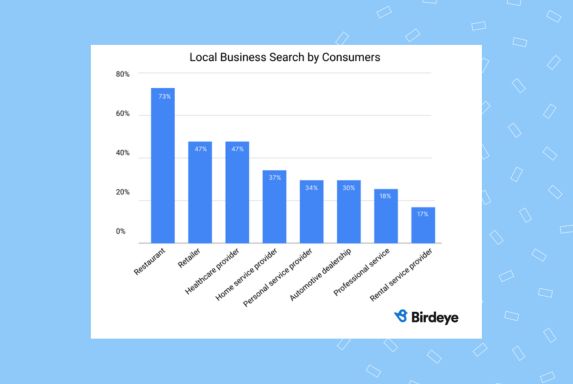
- Generate locally-relevant leads
Managing and optimizing local listings helps you generate locally relevant leads seamlessly. This strategy is more efficient than generating leads at a global scale and directing them to location managers to follow up.
By optimizing and monitoring local listings, you can ensure:
- The sales team calls the customer faster
- Corporate teams can avoid the repetitive task of assigning leads
- Improvement in conversion rates with local teams working with the local leads
Challenges faced by businesses in enterprise listing management
Enterprise listing management offers unique challenges due to its scale and the diversity of the local markets. These challenges include maintaining branding consistency across all locations, ensuring the accuracy of business information, and developing scalable processes that can be customized.
Let’s briefly explore these challenges.
Ensuring branding consistency
Enterprise businesses must ensure branding consistency across multiple platforms and locations. Customers should be able to recognize the local brand to be part of your overall brand image through consistent branding elements like colors, logo, and cover photo.
However, achieving this branding consistency becomes a challenge for enterprise businesses with 10 to 10,000+ live multi-locations and multiple listings for each location.
Ensuring data accuracy across multiple locations
Managing multiple listings in a multi-location business is complex, particularly when it comes to data accuracy. It becomes difficult for the corporate office to track obsolete and incorrect information. Additionally, dynamic information—such as seasonal hours, marketing campaigns, and new product launches—often needs updates that may be overlooked due to the organization’s scale.
Ensuring data accuracy is also challenging for enterprise businesses when both corporate teams and location managers handle duplicate listings. This poses a severe threat if the organization does not choose and appoint a single source of truth.
Complexity in scaling and customization
Many enterprises rely on bulk uploads or templated responses to list information, such as business descriptions, services provided, and unique selling points, across multiple locations. While this approach provides consistency, it can overlook opportunities to optimize listings for local search keywords and location-specific practices that generate high-quality leads.
How does enterprise listing management differ from single-location business listing management?
| Feature | Enterprise Listing Management | Single-Location Business Listing Management |
| Scope | Manages listings for multiple business locations, often across different regions or countries. | Manages listings for a single business location. |
| Complexity | High due to the need to manage multiple listings, ensure consistency, and handle potential discrepancies. | It is relatively low and involves managing a single listing information set. |
| Tools and Platforms | Requires advanced listing management software or platforms that can handle large-scale operations and automation. | It is possible to manage using essential online tools or platforms. |
| Data Management | It involves managing a central database of business information and ensuring its accuracy across multiple listings. | Requires managing a single set of business information. |
| Challenges | Ensuring consistency across multiple listings, managing changes efficiently, and maintaining accurate information for each location. | Ensuring accuracy and optimizing the single listing. |
| Benefits | Improved brand visibility, better SEO, enhanced customer experience, and increased efficiency. | Improved local SEO, increased foot traffic, and better customer engagement. |
Enterprise local listing management software strategies to monitor local listing performance effectively
Effective enterprise local listing management strategies that aid in lead generation, branding consistency, and increased revenue include:
- Build a presence on core listing sites
- Claim existing listings for accuracy
- Optimize for location-specific keywords
- Collect and manage reviews on all local listings
- Build location-specific web pages
- Choose a hybrid approach
- Treat local listings as a customer engagement channel
- Work with AI listing management tools
Let’s look at these strategies and how they impact enterprise listing management.
Build a presence on core listing sites
Studies show that business websites get almost 90% of their traffic from a few core listing sites, such as Google, Facebook, Bing, and DuckDuckGo, while the rest comes from niche-specific sites.
Building and optimizing listings on these platforms can help you secure that traffic without straining your resources. Focusing on a few core sites makes improving brand consistency, data accuracy, and local search rankings easy.
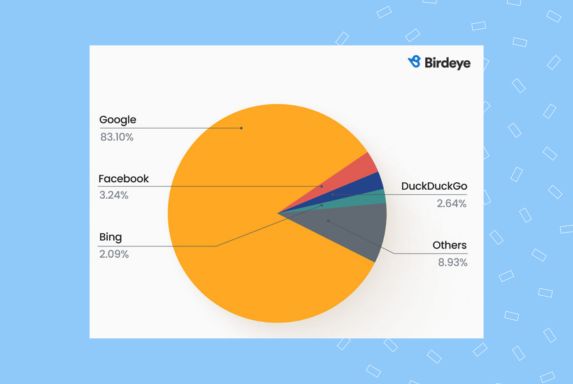
“Citations are crucial for maintaining a consistent brand narrative, especially in the age of generative AI. From a local SEO standpoint, citations cause a small bump in rankings if they are local citations. Focusing on the core citations and those where your customers are is essential. This way, you can avoid the hassle of updating every single listing site. Additionally, concentrating on a smaller set of citations reduces the workload of keeping them all up to date.”
Ben Fisher – Co-Founder/Lead Consultant, Steady Demand & Google Business Profile Product Expert
Claim existing listings for accuracy
Most businesses have multiple listings scattered across niche-specific sites, even if they did not create them. Often, these obscure sites may not drive traffic but can harm the brand image. That is why enterprise businesses need to claim all listings and ensure accurate business information is updated consistently.
Find and claim all business listings across locations to control the narrative, boosting brand value and improving efficiency.
Pro Tip: Did you know that claimed and verified Google Business Profiles lead to 105 average monthly visits to business websites? Use Birdeye’s scanning tool to track all listings for your multi-location business and claim them right from the dashboard for efficiency.
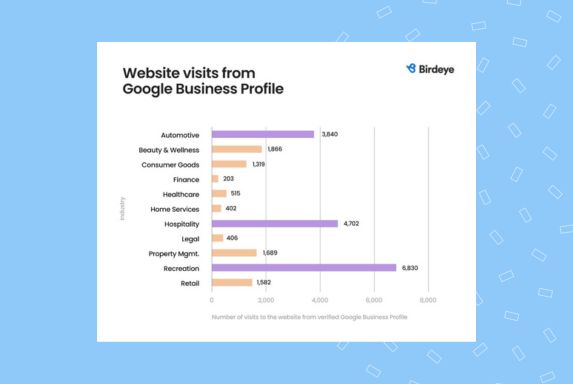
Optimize for location-specific keywords
While branding consistency is essential, enterprise businesses must also optimize individual listings for high-value local keywords. Optimizing your local listings for high-volume keywords can improve visibility, rank higher on local searches, and drive higher traffic to your business websites.
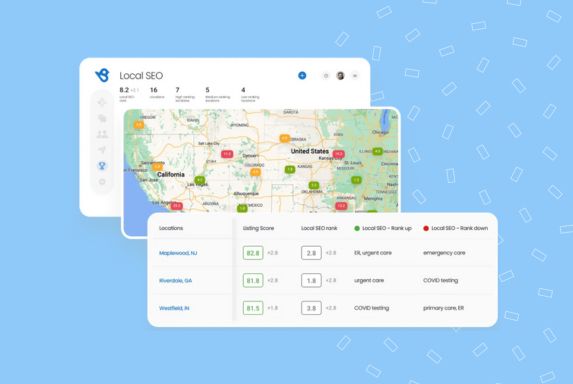
Scan your local competitor’s listings and check what they rank for. Pick relevant keywords that help your Google Business Profile rank in the local map pack (top three results).
Collect and manage reviews on all local listings
Search engines like Google or industry-specific listing sites like Angie’s or DealerRater promote business listings with higher star ratings and glowing customer reviews. By generating and managing reviews across these listing sites, businesses can drive higher foot traffic, website visitors, and brand awareness.
The key to success here is to consistently include major listings in your review generation messages. Many listing sites also allow the display of third-party customer reviews; leveraging this feature ensures that every potential customer, who views your listing, sees all the positive reviews your business has.
Build location-specific web pages
Local web pages validate the information in your listings and help Google and other major listing platforms understand that you are a credible and trustworthy brand in the marketplace. Building location-specific web pages also improves your chances of ranking high for local searches.
Link the location-specific web pages to local listings so your target audience gets relevant information without looking further.
“Businesses should have web pages for every location – list services, informational videos, product images, and feature customer testimonials. The web pages provide a reason for the visitors to choose you and not return to Google to pick your competitor instead.”
Steve Wiideman, Wiideman consulting group at Birdeye View
Choose a hybrid approach
Instead of managing all listings at the corporate level or handing control over to local managers, a hybrid approach ensures consistency with location-specific personalization.
In an effective hybrid approach, businesses:
- Build, claim, and optimize the local listings at the corporate level
- Manage the local listings regarding updating business information, promoting services, and managing customer reviews
Monitor local listings to engage with leads
Local listings can be more than just a place to showcase your business location and other pertinent information. Your local listing is the first place a customer meets your business; they are highly likely to contact you here to get more information on your business.
Regularly monitoring your listings can help you connect with potential customers, provide accurate information, and help them choose you over your competitors.
For example, the Google Business Profile Q&A section allows visitors to post questions to learn more about the business. However, anyone can answer those. Monitoring listings ensures your teams jump in and provide accurate information before other internet users answer.
Work with AI listing management tools
Enterprise local listing management can go beyond managing your profiles and leveraging these listing management tools to grow your business. AI listing management solutions like Birdeye can help enterprises:
- Monitor individual location performance, compare them, and identify top-performing and struggling locations
- Identify issues across locations with review sentiment analysis
- Compare your business performance with local competitors by monitoring review keywords and local search rankings
- Improve service quality by analyzing customer reviews on each local listing.
Pro tip: By tracking the Birdeye Score, enterprise businesses can quickly assess which locations are excelling in local engagement and which require attention.
Supercharge local listing management for your enterprise business
Want to see the impact of Birdeye on your business? Watch the Free Demo Now.
How do you choose the best enterprise local listing management software?
Enterprise businesses need sophisticated, complex, scalable, and user-friendly solutions to manage multiple local listings across multiple platforms. Some of the features you need in an enterprise listing management software are:
- Custom user access
- Local listing scanner
- Centralized dashboard
- AI analytics and reporting
Let us explore these functionalities and their significance in enterprise listing management.
Custom user access
The hybrid approach is the most effective method for enterprise business listing management, as it maintains branding consistency while allowing for regular updates of location-specific information.
Implementing this approach can be tricky without access-based user controls. The ideal listing management tool should offer customizable user access, enabling:
- Location managers to handle their profiles
- Corporate managers to monitor all locations
- External agencies to manage SEO services remotely
Local listing scanner
Claiming local listings, correcting inconsistencies, and ensuring that all listings accurately reflect your brand image starts by knowing how to find your local listings. This becomes a more significant challenge for enterprise businesses managing over twenty locations.
That is why enterprise listing management software requires a local listing scanner to identify all existing listings for your business for each location, spot inaccuracies, and alert the team for action.
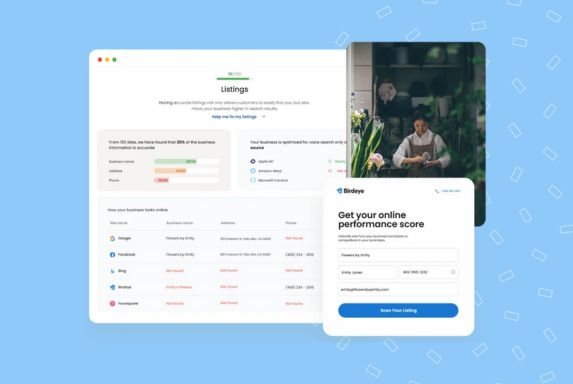
Birdeye’s local SEO scan tool checks all online directories, listing platforms, and search engines to locate relevant business listings.
Centralized dashboard
Multiple locations mean multiple listings across various listing platforms, including a few on social media. The ability to monitor all listings from a centralized dashboard allows the corporate teams to spot issues, analyze the performance of critical locations, and ensure everything is in sync.
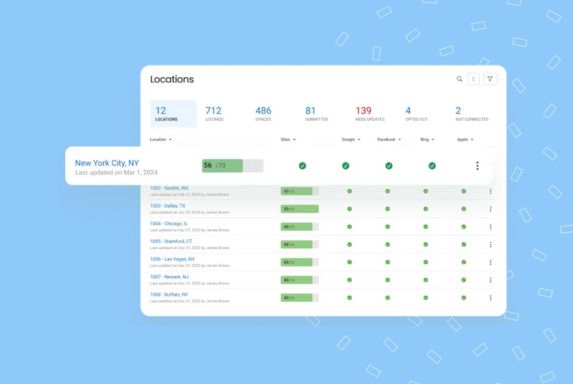
A comprehensive enterprise business listing management tool like Birdeye allows teams to view all business listings, monitor online presence across online directories, and scale on core business listing sites.
AI analytics and reporting
Enterprise listing management software is only as effective as its reporting capabilities. Your tool must provide keen insights into your performance across locations and help you make data-driven decisions.
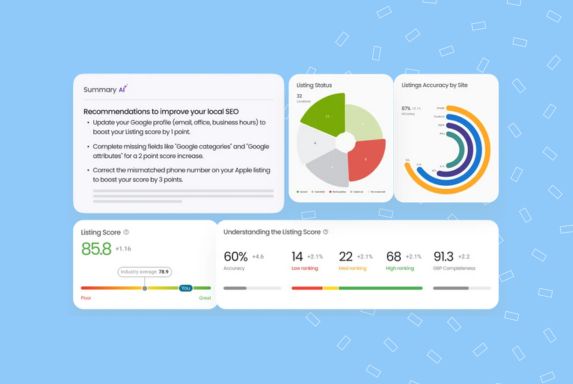
Recognized by G2 as the Category Leader in Enterprise Reputation Management, Birdeye offers enterprises a trusted, integrated solution to scale efficiently. With a tool like Birdeye Listings AI Agents, businesses can:
- Identify top and bottom-performing locations with ease
- Check local keyword rankings to optimize listings
- Analyze the performance of each location with a comprehensive listing score
- Receive AI-generated recommendations to improve SEO performance
- Optimize business description with Gen AI
- Generate custom reporting dashboards that empower your teams to make insightful business decisions
Mastering enterprise listing management: Key to success for multi-location business
Enterprise local listing management is not just a marketing tactic; it’s a critical business strategy for multi-location enterprises to thrive. Effectively managing your online presence across various locations can significantly boost brand consistency, local search visibility, and, ultimately, your bottom line.
With the right strategies and tools, you can overcome challenges related to branding consistency, complex scalability issues, and data accuracy.
Critical takeaways for mastering enterprise listing management include:
- Focus on core listing sites while maintaining a presence across relevant platforms
- Adopt a hybrid approach, balancing corporate oversight with local customization
- Leverage AI-powered tools for efficient management, analytics, and optimization
- Continuously monitor, update, and optimize your listings for peak performance
In the age of “near me” searches and localized digital experiences, your online listings are often the first point of contact between your business and potential customers. Mastering enterprise listing management creates a cohesive, engaging, and locally relevant digital storefront for each of your physical locations.
Tip: To truly master enterprise listing management, companies should leverage AI-driven insights. Birdeye Search AI complements Listings AI by continuously analyzing local search performance, helping businesses optimize listings, improve local SEO, and enhance customer engagement at every location.
FAQs on enterprise listing management
Some critical enterprise listing management platforms are Google, Apple Maps, Bing, and Facebook.
AI can analyze multiple listings’ competitor performance and provide keen insights to improve your performance across locations.
Enterprise listing management works better in-house if you have a dedicated team to use the business listing management tool. If not, hiring an SEO agency with access to enterprise-specific listing management software would be more effective.
They interpret structured and consistent business data like NAP details, reviews, and categories across trusted sources to accurately describe your brand and locations.
Yes, but quality and consistency now matter more than volume as AI systems rely on verified citations to confirm business credibility and relevance.
Treating listings as static data instead of continuously updated assets, leading to inconsistencies that confuse both customers and AI systems.
Duplicate suppression is the process of removing redundant listings to prevent conflicting data, helping AI systems recognize and rank your business correctly.
Build, scale, and manage multi-location listings with Birdeye Listings AI Agents
For multi-location and Fortune 500 enterprises, managing listings at scale is more than an SEO task; it’s an operational challenge. The pressure to ensure brand consistency, data accuracy, and local SEO optimization grows exponentially with every location. Manual updates not only create inefficiencies but also expose the business to compliance risks, data mismatches, and missed growth opportunities.
That’s why Birdeye built a comprehensive, GenAI-powered enterprise listings management system, trusted by over 200,000 businesses, connected to 3,000+ integrations, and publishing across hundreds of major directories. With Birdeye Listings AI Agents, enterprises can:
- Build, scale, and manage comprehensive profiles across core listing sites such as Google, Apple, Bing, and Facebook from a central dashboard
- Leverage Gen AI-powered insights to improve local SEO rankings, outshine/outrank competitors, improve customer experience, and more.
- Optimize listings for better customer engagement with integrated lead forms, location-specific web pages, appointments, and more.
Transform enterprise listing management with Birdeye today. Watch a free demo to learn how.

Originally published









